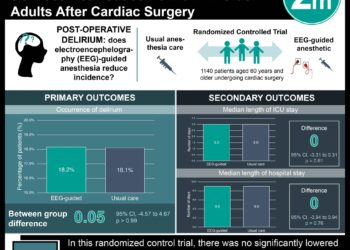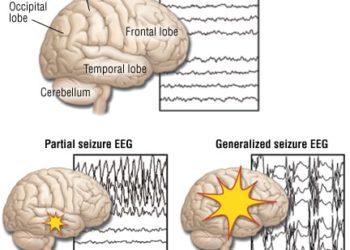Infant screen use is associated with alterations in neurocognitive measures
1. In a prospective cohort study, screen time at 12 months of age was associated with altered electroencephalography measures, attention, and executive functioning in childhood.
Evidence Rating Level: 2 (Good)
Study Rundown: Neuroimaging studies have suggested an association between screen exposure and altered brain structure in white matter tracts known to be critical for executive functioning. Interestingly, changes in electroencephalography (EEG) waveforms have been shown to correlate with various cognitive functions and attentional control. Given the limited research in this field, this study aimed to examine the associations between infant screen time, EEG markers, and school-age cognitive outcomes. In this study, infant screen use at 12 months of age was associated with altered EEG measures, objective laboratory measures, and teacher-reported measures of executive functioning and attention when controlling for covariates. Furthermore, the relationship between EEG changes and screen time persisted when controlling for household income, a variable that has previously been shown to affect childhood screen time in this dataset. Electrical activity (as measured by EEG) in the frontocentral and parietal brain regions partially mediated the relationship between neurocognitive outcomes and infant screen use. One limitation of this study is its reliance on parent-reporting for screen time, which may be subject to recall bias. In general, this study provides evidence that early childhood exposure to screen use in infancy has broad implications for the development of high-order cognitive skills and should inform future recommendations for parents and families. Further studies are required to directly measure the association between screen use and cognitive skills, while carefully controlling for confounding factors such as family and social environments.
Click here to read the article in JAMA Pediatrics
Relevant Reading: Early television exposure and subsequent attentional problems in children
In-Depth [prospective cohort]: In the Growing Up in Singapore Toward Healthy Outcomes (GUSTO), a population-based prospective cohort, women aged 18 years and older were enrolled in their first trimester of pregnancy from 2 public hospitals in Singapore between June 2009 and December 2010. 437 Maternal-child dyads aged 12 months to 9 years were followed until March 2020. Those with major neurologic conditions were excluded. The primary exposure was parent-reported screen time at 12 months of age. EEG measures (power spectral density) at 18 months of age, teacher-reported questionnaires of attention (Child Behavior Checklist; CBCL) and executive control (Behavior Rating Inventory of Executive Function; BRIEF-2), as well as neurodevelopmental assessments with objective laboratory tasks (Developmental Neuropsychological Assessment; NEPSY-II) at 9 years of age were the outcome measures used. After adjusting for covariates, screen time at 12 months of age was associated (η2, 0.03-0.16; Cohen d, 0.35-0.87) with performance on teacher-reported and objectively measured scales for attention and executive functioning at 9 years of age. A subset of 157 children had an EEG performed at 18 months of age, which showed a linear correlation (r = 0.35-0.37) between 12-month screen use and EEG measures known to be associated with cognitive functions and attentional control (relative theta power and theta/beta ratio in frontocentral/parietal regions). The EEG measures correlated with objective laboratory measures, but not with teacher-reported measures. Due to the previously reported relationship in GUSTO between socioeconomic status and infant screen use, authors performed a secondary analysis adding household income as an exogenous variable in the structural equation model and found that EEG measures were still partially mediated by screen time and accounted for 39.4% of the previously observed association.
Image: PD
©2023 2 Minute Medicine, Inc. All rights reserved. No works may be reproduced without expressed written consent from 2 Minute Medicine, Inc. Inquire about licensing here. No article should be construed as medical advice and is not intended as such by the authors or by 2 Minute Medicine, Inc.





![The ABCD2 score: Risk of stroke after Transient Ischemic Attack (TIA) [Classics Series]](https://www.2minutemedicine.com/wp-content/uploads/2013/05/web-cover-classics-with-logo-medicine-BW-small-jpg-75x75.jpg)

